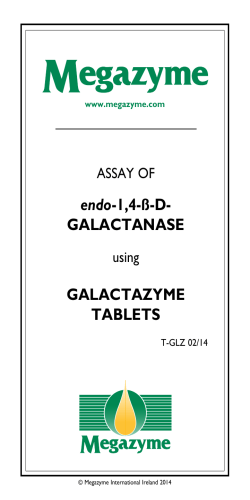
Data Booklet
www.megazyme.com ASSAY OF endo-1,4-β-Mannanase using BETA-MANNAZYME TABLETS T-MNZ 11/14 © Megazyme International Ireland 2014 SUBSTRATE: The substrate employed is Azurine-crosslinked carob galactomannan (AZCL-Galactomannan). This substrate is prepared by dyeing and crosslinking highly purified carob galactomannan to produce a material which hydrates in water but is water insoluble. Hydrolysis by endo-1,4-β-mannanase produces water soluble dyed fragments, and the rate of release of these (increase in absorbance at 590 nm) can be related directly to enzyme activity. The substrate is supplied commercially in a ready-to-use tablet form as Beta-Mannazyme Tablets. STOCK BUFFER: (Sodium acetate buffer, 2 M, pH 4.0) Add 114 mL of glacial acetic acid (1.05 g/mL) to 800 mL of distilled water. Adjust the pH of this solution to pH 4.0 by the addition of 4 M (16 g/100 mL) sodium hydroxide solution. Adjust the volume to 1 litre. EXTRACTION/DILUTION BUFFER: [Na acetate, 50 mM, pH 4.0, plus Na azide (0.02%)]. Add 25 mL of stock buffer to 950 mL of distilled water and adjust the pH to pH 4.0 by dropwise addition of 1 M hydrochloric acid solution. Add and dissolve 0.2 g of sodium azide. Adjust the volume to 1 litre. NOTE: Do not add the sodium azide until the pH is adjusted. Acidification of sodium azide releases a poisonous gas. Sodium azide is a poisonous chemical and is added solely as a preservative against microbial infection. This chemical can be deleted from the buffers, but their long- term stability will be reduced. ENZYME EXTRACTION AND DILUTION: Add 1.0 g of powder enzyme preparation, or 1.0 mL of liquid enzyme preparation (using a positive displacement pipettor), to a 100 mL volumetric flask, adjust to volume with extraction buffer (50 mM sodium acetate buffer, pH 4.0) and stir on a magnetic stirrer for 15 min. Ensure that the preparation is completely dissolved or dispersed. (This is referred to as the Original Enzyme Extract). Filter an aliquot of the slurry through a Whatman No. 1 (9 cm) filter circle. Dilute extracts by adding 1.0 mL of enzyme solution in 9.0 mL of dilution buffer with thorough mixing. Repeat this operation to obtain the correct enzyme concentration for assay. (For Gamanase from Novozymes, an overall dilution of the original liquid solution of 50-fold is required). 1 ASSAY PROCEDURE: 1. Pre-equilibrate an aliquot (0.5 mL) of suitably diluted enzyme preparation in sodium acetate buffer (0 mM, pH 4.0) in 16 x 120 mm glass test tubes at 40°C for 5 min. 2.Initiate the reaction by adding a Beta-Mannazyme tablet. The tablet hydrates rapidly. Do not stir the suspension. Incubate at 40°C for exactly 10 min. 3. Terminate the reaction by adding 10.0 mL of Tris buffer salt solution (2% w/v, pH ~ 10; Megazyme Cat. no. B-TRIS500) with vigorous stirring on a vortex mixer. 4. Leave the tubes at room temperature for about 5 min, and then stir them again. 5. Filter the slurry through a Whatman No. 1 (9 cm) filter circle. 6. Measure the absorbance of the filtrate at 590 nm against a substrate blank. A substrate/enzyme blank is prepared by adding Tris buffer salt to the enzyme solution before the addition of the Beta-Mannazyme tablet. NOTE: A single blank is required for each set of determinations and this is used to zero the spectrophotometer. The absorbance of the reaction solutions are measured at 590 nm against the blank. If the absorbance is above 1.4, dilute an aliquot of the enzyme extract with an equal volume of extraction/dilution buffer and repeat the assay. After the Tris buffer salt solution is added, the suspensions must be stored at room temperature. If stored at higher temperatures, the substrate will slowly degrade in the alkaline conditions resulting in higher blank absorbance values. STANDARDISATION: A standard curve relating the activity of purified A. niger endo-1,4-β-mannanase on Beta-Mannazyme (Lot 00501) is shown in Figure 1. Enzyme activity was first standardised on carob galactomannan at substrate concentration of 10 mg/mL in 100 mM sodium acetate buffer (pH 4.0) at 40°C using the Nelson/Somogyi reducing sugar procedure. One Unit of activity is defined as the amount of enzyme required to release one micromole of mannose reducing-sugar equivalents per minute under the defined assay conditions. 2 CALCULATION OF ACTIVITY: e ndo-β-Mannanase activity in the sample being assayed is determined by reference to the standard curve or to a regression equation for Beta-Mannazyme (see Figure 1). The regression equation varies slightly from batch to batch of BetaMannazyme tablets. To minimise this inconvenience, large batches of tablets are prepared. For Beta-Mannazyme Lot 00501: endo-β-Mannanase, milli-Units/assay (i.e. 0.5 mL) = 21.9 x Abs.2 + 60.6 x Abs. -3.0 endo-β-Mannanase activity per mL or g of original preparation: = milli-Units/assay x 2 x 1/1000 x Dilution where: 2 = conversion from 0.5 mL (as assayed) to 1.0 mL. 1/1000 = conversion from milliUnits to Units. Dilution = total dilution of the original enzyme preparation. "!!!$ #!#! ! !"!!!$ Figure 1. endo-1,4-β-mannanase (A. niger) standard curve on BetaMannazyme tablets (Lot 00501). 3 NOTES: 4 NOTES: 5 NOTES: 76 Megazyme International Ireland, Bray Business Park, Bray, Co. Wicklow, IRELAND. Telephone: (353.1) 286 1220 Facsimile: (353.1) 286 1264 Internet: www.megazyme.com E-Mail: [email protected] WITHOUT GUARANTEE The information contained in this booklet is, to the best of our knowledge, true and accurate, but since the conditions of use are beyond our control, no warranty is given or is implied in respect of any recommendation or suggestions which may be made or that any use will not infringe any patents. 87
© Copyright 2026










